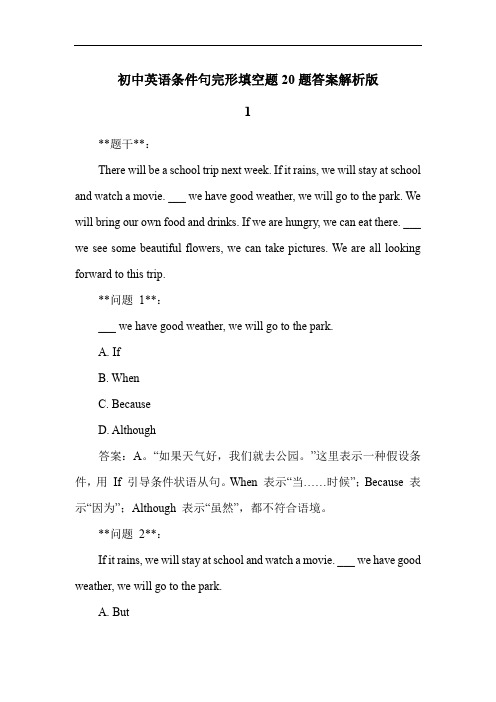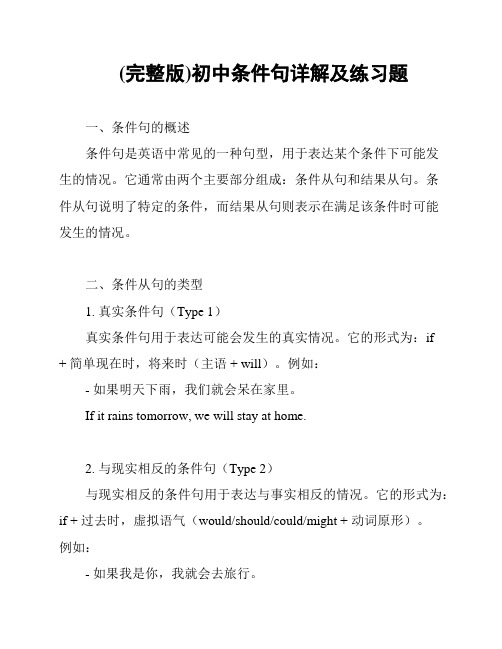初中英语条件句讲解 练习及答案
理解中的条件句练习题及

理解中的条件句练习题及解答条件句是英语中的一种语法结构,用来表示某种条件下发生的情况。
掌握条件句的用法对于学习英语具有重要的作用。
本文将介绍一些常见的条件句练习题,并提供相应的答案解析。
一、第一类条件句(现在事实)1. If I have time, I _______ (go) to the cinema with you.答案:will go解析:根据第一类条件句的用法,主句使用一般将来时,从句使用一般现在时。
表示如果我有时间,我将和你一起去电影院。
2. If it rains, we _______ (stay) at home.答案:will stay解析:从句使用一般现在时,主句使用一般将来时。
表示如果下雨,我们将待在家里。
3. If she _______ (not come), we will start without her.答案:doesn't come解析:从句使用一般现在时的否定形式,主句使用一般将来时。
表示如果她不来,我们将开始没她。
二、第二类条件句(现在假设)1. If I were a bird, I _______ (fly) in the sky.答案:would fly解析:从句使用虚拟语气的过去式形式,主句使用“would + 动词原形”。
表示如果我是一只鸟,我会在天空中飞翔。
2. If she _______ (study) harder, she would pass the exam.答案:studied解析:从句使用虚拟语气的过去式形式,主句使用“would + 动词原形”。
表示如果她学习更努力,她会通过考试。
3. If it _______ (not rain), we would have a picnic.答案:didn't rain解析:从句使用虚拟语气的过去式形式,主句使用“would + 动词原形”。
表示如果不下雨,我们会去野餐。
初中英语条件句完形填空题20题答案解析版

初中英语条件句完形填空题20题答案解析版1**题干**:There will be a school trip next week. If it rains, we will stay at school and watch a movie. ___ we have good weather, we will go to the park. We will bring our own food and drinks. If we are hungry, we can eat there. ___ we see some beautiful flowers, we can take pictures. We are all looking forward to this trip.**问题1**:___ we have good weather, we will go to the park.A. IfB. WhenC. BecauseD. Although答案:A。
“如果天气好,我们就去公园。
”这里表示一种假设条件,用If 引导条件状语从句。
When 表示“当……时候”;Because 表示“因为”;Although 表示“虽然”,都不符合语境。
**问题2**:If it rains, we will stay at school and watch a movie. ___ we have good weather, we will go to the park.A. ButB. OrC. SoD. And答案:D。
“如果下雨,我们就待在学校看电影。
并且如果天气好,我们就去公园。
”这里表示顺承关系,用And。
But 表示转折;Or 表示“或者”;So 表示“所以”,都不符合语境。
**问题3**:If we are hungry, we can eat there. ___ we see some beautiful flowers, we can take pictures.A. IfB. WhenC. BecauseD. Before答案:A。
初二英语条件句单选题30题及答案

初二英语条件句单选题30题及答案1.If it rains tomorrow, we _____ stay at home.A.willB.wouldC.shouldD.must答案:A。
本题考查if 引导的真实条件句中主将从现的用法。
if 引导的条件句中,主句用一般将来时,从句用一般现在时。
A 选项will 是一般将来时的标志;B 选项would 用于虚拟语气;C 选项should 表示应该;D 选项must 表示必须。
所以选A。
2.If I have time, I _____ help you with your homework.A.willB.wouldC.shouldD.must答案:A。
同样是if 引导的真实条件句,主将从现。
A 选项will 符合一般将来时;B 选项would 虚拟语气;C 选项should 应该;D 选项must 必须。
选A。
3.If my parents allow me, I _____ go to the party.A.willB.wouldC.should答案:A。
if 引导的真实条件句,主将从现。
A 选项will 是一般将来时;B 选项would 虚拟语气;C 选项should 应该;D 选项must 必须。
选A。
4.If you study hard, you _____ get good grades.A.willB.wouldC.shouldD.must答案:A。
if 引导的真实条件句,主将从现。
A 选项will 一般将来时;B 选项would 虚拟语气;C 选项should 应该;D 选项must 必须。
选A。
5.If she _____ early, she can catch the bus.A.gets upB.got upC.will get upD.would get up答案:A。
if 引导的真实条件句,主将从现,从句用一般现在时。
英语专项语法时态13条件句之第一条件讲解+练习+答案firstconditional

英语专项语法时态13条件句之第一条件讲解+练习+答案firstconditionalFirst Conditional第一条件句主谓模块If it rains, I won't go to the park.如果下雨,我就不去公园了。
If I have enough money, I'll buy some new books.如果我有足够的钱,我就买些新鞋。
She'll be late if the train is delayed.如果火车晚点,她会迟到的。
She'll miss the bus if she doesn't leave soon.如果她不快点走,她会赶不上公共汽车的。
If I see her, I'll tell her.如果我看到她,我会告诉她。
用法总结The first conditional is used to talk about things which might happen in the future. Of course, we can't know what will happen in the future, but this describes possible things, which could easily come true.第一条件句用来谈论将来可能发生的事情。
当然,我们不知道将来会发生什么,但这描述了可能发生的事情,这些事情很容易实现。
First vs. Zero Conditional:第一条件句vs.零条件句:The first conditional describes a particular situation, whereas the zero conditional describes what happens in general.第一条件句描述了一个特定的情况,而零条件句描述了一般情况下发生的事情。
(完整版)初中条件句详解及练习题

(完整版)初中条件句详解及练习题一、条件句的概述条件句是英语中常见的一种句型,用于表达某个条件下可能发生的情况。
它通常由两个主要部分组成:条件从句和结果从句。
条件从句说明了特定的条件,而结果从句则表示在满足该条件时可能发生的情况。
二、条件从句的类型1. 真实条件句(Type 1)真实条件句用于表达可能会发生的真实情况。
它的形式为:if+ 简单现在时,将来时(主语 + will)。
例如:- 如果明天下雨,我们就会呆在家里。
If it rains tomorrow, we will stay at home.2. 与现实相反的条件句(Type 2)与现实相反的条件句用于表达与事实相反的情况。
它的形式为:if + 过去时,虚拟语气(would/should/could/might + 动词原形)。
例如:- 如果我是你,我就会去旅行。
If I were you, I would travel.3. 假设条件句(Type 3)假设条件句用于表达与过去发生的事情相反的情况。
它的形式为:if + 过去完成时,虚拟语气(would/should/could/might + have + 过去分词)。
例如:- 如果你昨天早点睡觉了,你今天早上就不会那么累。
If you had gone to bed earlier last night, you wouldn't be so tired this morning.三、条件句的练题1. 根据给定的情景,用条件句完成以下句子:- 如果我多研究,我_____________。
- 如果他们赢得比赛,他们_____________。
2. 给定一段叙述,根据所学的条件句类型,将句子改写为条件句形式。
四、总结条件句是英语语法中必须掌握的重要句型之一。
通过研究条件句的不同类型和练题的完成,我们可以更好地掌握条件句的用法,并能在实际应用中灵活运用。
希望本文能对初中学生的研究有所帮助。
最新初中英语条件句讲解-练习及答案

条件句一、考点、热点回顾【词汇辨析】1. accept与receiveaccept “接受”,表示其行为是由主观意愿决定的。
I accepted it without question. 我毫无疑问地接受了它。
We have accepted his proposal. 我已接受了他的建议。
receive “接到、收到、受到”表示其行为与主观意愿无关。
I received a letter from him. 我收到了他的来信。
He received the present, but he did not accept. 他收到了礼物,但没有接受下来。
He received a good education.他受到了良好的教育。
[注意] 在表示接待、接见时,通常用receive, 而不用accept.如:We often receive foreign guests. 我们经常接待外宾。
2. agree to,agree with与agree on(up on)agree to “同意、应允”通常用于同意某件事情(我们可以同意我们自己有不同看法而并不赞同的事情)。
Do you agree to this plan?He agreed to my proposal.他同意了我的提议。
agree with “同意、赞同”常常表示同某人意见一致,也可表赞同某件事情。
还有“(气候、食物等)适合”之意。
如:Do you agree with me ?I agree with all you say.我同意你所说的。
His words do not agree with his actions.他言行不一致。
Too much meat doesn’t agree with her. 吃太多肉对她身体不合适。
[注意]:agree with 不能用于被动语态。
agree on /upon “对……取得一致意见”指两方或多方就某个问题取得了一致的意见或达成了某种协议。
最新中考初中英语if条件句讲解及练习

最新中考初中英语if条件句讲解及练习中考初中英语if条件句讲解及练习【知识要点】定义:常见的if条件状语从句表示在某条件下,某事很可能发生,条件是可能存在的,主句中某种情况发生的概率也是很高的。
E.g. If you ask him,he will help you.如果你请他帮忙,他会帮你的。
E.g. If you fail in the exam,you will let him down.如果你考试不及格,你会让他失望的。
E.g. If you have finished the homework,you can go home.如果你作业做完了就可以回家了。
另外,if从句还表示不可实现的条件或根本不可能存在的条件,也就是一种虚拟的条件或假设。
从句多用一般过去时或过去完成时,表示对现在或过去的一种假设。
E.g.If I were you,I would invite him to the party.如果我是你,我会邀请他参加聚会。
E.g.I would have arrived much earlier if I had not been caught in the traffic.要不是交通堵塞,我本会来得早一些。
另外你还要注意if 条件句的时态搭配1.if从句用一般现在时,主句用一般将来时E.g. If he runs he’ll get there in time.如果他用跑的,他就会及时赶到那儿。
E.g. The cat will scratch you if you pull her tail.如果你拉猫的尾巴,它就会抓你。
2.if从句用一般现在时,主句用may/might/canE.g. If the fog gets thicker the plane may/might be diverted.如果雾在大一些,飞机可能就会改在别的机场降落。
E.g. If it stops snowing we can go out.如果雪停了,我们就可以出去。
中考英语条件句单选题60题(答案解析)

中考英语条件句单选题60题(答案解析)1.If it rains tomorrow, we ____ stay at home.A.willB.wouldC.shouldD.must答案:A。
解析:if 引导的真实条件句,主句用一般将来时,从句用一般现在时。
选项 A 符合此语法规则;选项B 是过去将来时,不符合;选项C 应该,不符合条件句的语法规则;选项D 必须,也不符合条件句的语法规则。
2.My mother will cook dinner if she ____ time.A.hasB.haveC.hadD.will have答案:A。
解析:if 引导的真实条件句,主句用一般将来时或祈使句或含有情态动词的句子,从句用一般现在时。
选项A 是一般现在时第三人称单数形式,符合语法规则;选项B 是原形,主语是she 不适用;选项C 是过去式,不符合;选项D 是一般将来时,也不符合。
3.If I study hard, I ____ good grades.A.getB.will getC.gotD.would get答案:B。
解析:if 引导的真实条件句,主句用一般将来时,从句用一般现在时。
选项B 符合语法规则;选项A 是一般现在时,不符合;选项C 是过去式,不符合;选项D 是过去将来时,不符合。
4.We will go for a picnic if the weather ____ fine.A.isB.will beC.wasD.would be答案:A。
解析:if 引导的真实条件句,主句用一般将来时,从句用一般现在时。
选项 A 符合语法规则;选项B 是一般将来时,不符合;选项C 是过去式,不符合;选项D 是过去将来时,不符合。
5.If he ____ early, he can catch the bus.A.gets upB.get upC.got upD.would get up答案:A。
- 1、下载文档前请自行甄别文档内容的完整性,平台不提供额外的编辑、内容补充、找答案等附加服务。
- 2、"仅部分预览"的文档,不可在线预览部分如存在完整性等问题,可反馈申请退款(可完整预览的文档不适用该条件!)。
- 3、如文档侵犯您的权益,请联系客服反馈,我们会尽快为您处理(人工客服工作时间:9:00-18:30)。
条件句一、考点、热点回顾【词汇辨析】1. accept与receive,表示其行为是由主观意愿决定的。
accept “接受”I accepted it without question. 我毫无疑问地接受了它。
We have accepted his proposal. 我已接受了他的建议。
receive “接到、收到、受到”表示其行为与主观意愿无关。
I received a letter from him. 我收到了他的来信。
He received the present, but he did not accept. 他收到了礼物,但没有接受下来。
He received a good education.他受到了良好的教育。
[注意] 在表示接待、接见时,通常用receive, 而不用accept.如:We often receive foreign guests. 我们经常接待外宾。
agree to,agree with与agree on(up on)2.agree to “同意、应允”通常用于同意某件事情(我们可以同意我们自己有不同看法而并不赞同的事情)。
Do you agree to this plan?He agreed to my proposal.他同意了我的提议。
agree with “同意、赞同”常常表示同某人意见一致,也可表赞同某件事情。
还有“(气候、食物等)适合”之意。
如:Do you agree with me ?I agree with all you say.我同意你所说的。
His words do not agree with his actions.他言行不一致。
Too much meat doesn't agree with her. 吃太多肉对她身体不合适。
agree with 不能用于被动语态。
[注意]:指两方或多方就某个问题取得了一致的意见或达成了某种协议。
agree on /upon “对……取得一致意见”经过讨论,双方就下次会议日After discussion the two sides agreed on the date of the next meeting. 期达成了协议。
他们对这个计划意见一致。
They all agree on the plan. 如::此句型可转换成agree in doing sth.[注意]All of them agreed on / upon it.他们对做这个问题达成了共识。
= All of them agreed in doing it.【条件句】(二)虚拟条件句虚拟语气表示一种假设的情况,或一种主观的愿望,即动词所表示的动作或状态并非事实,或不可能实现。
英语虚拟语气的形式有下列几种:如:If he had the time, John would make a trip to China to see the Great Wall.).If I were you, I would give up drinking immediately(立即、立刻t have a cold, I would go to your birthday party. 'If I didn二.与将来事实相反如:If you should lose, what would you do?If I were to see her tomorrow, I would tell her the truth.如:known that it was going to rain, I would never have gone for a walk in the country. If I'dt have missed your birthday party. If I hadn't had a cold last week, I wouldn'典型例题二、______,we won't go on a picnic.I don't know if it ______tomorrow. If it ( )1.C. will rain;will rainB. will rain;rains rains;rainsA.)2. In summer , food goes bad easily ________ it is put in the refrigerator.(C. unless B. if A. until)3. --I hear Jack Chan will come to Laiwu next week.(--Really? _______ he comes, my younger sister will be very happy,Before. D Unless .BUntil C.If A .Could we play football in your playground, Sir ? —)4. (No,_______ you have the principal's note. --D.sinceC.becauseB.unless A.if)5. Many children like fried chicken _______it is unhealthy food.(C.althoughB.becauseA.ifAll the students in Class 5 will climb the mountain if it _______ rain tomorrow.)6. (D. doesn't C. didn't B. don't A. won't---Would you like to go bike riding with us tomorrow?)7 (---Sure, ________ I am busy.D. until C. when A. since B. unless)8. I don't like bread. I won't eat it ________ I am very hungry.(C. ifB. unless A. when)9. You'd better look up the new word in a dictionary _____ you don't know it.(D. whether C. though B. that A. if)10. After the meeting, we will have a party. If you _______ free, come and join us.(C. wereB. will be A. are课后练习三、)1. I'll go for a walk with you if it ________ tomorrow.(D. not rains C. will rain A. won't rain B. doesn't raingo shopping with her. )2. I'm waiting for my Mum. ________, I'll(B. If she comes A. If she doesn't comeD. If she won't come C. If she will come)3. ---Tommy, do you know if Frank ________ to the zoo this Sunday if it ________? ( ---Sorry, I have no idea.B. goes; is fine A. will go; is fineD. goes; will be fine C. will go; is going to be fine)4. If I _______ you, I would wear the shirt and the tie.(D. will be C. were A. am B. was)5. What would you do if you _______ a lot of money? (D. have C. will have A. had B. have had)6. In Britain, you must be 18 ________ you want to drive a car.(D. if B. because C. so A. why)7. If I _______ you, I'd take the small apple. (C. wasA. amB. were)8. Susan will not arrive at the airport on time _______ she hurries up.(D. unless C. when A. once B. if)9. If my father ________ back, please let me know.(C. come B. will come A. comes)10. Let's see ___we can find some information about the city.(D. which C. what A. that B. ifa big house.you, I ( )11.If IA. was, would buyB. were, would like to buyC. were, would buyD. was, boughtomorrow, please tell me.)12.If he (D. came C. will come A. come B. comesthe lottery( 彩票( )?)13.What would you do if youD. have won C. are going to win B. won A. win典型例题DC6A4B5B 12C3除非我很“我会和你们一起自行车旅行的,由关键词Sure可推断引导的条件状语从句。
7B。
考查unless 。
B、D三项,选忙”,故排除A、CB8、B你最好在字典里查阅它”可排除if引导的条件状语从句。
结合题意“如果你不知道那个新词,考查9A。
A10A。
C、D三项,选课后练习B。
在条件状语从句中,从句不能用一般将来时,应用一般现在时,故正确答案为。
